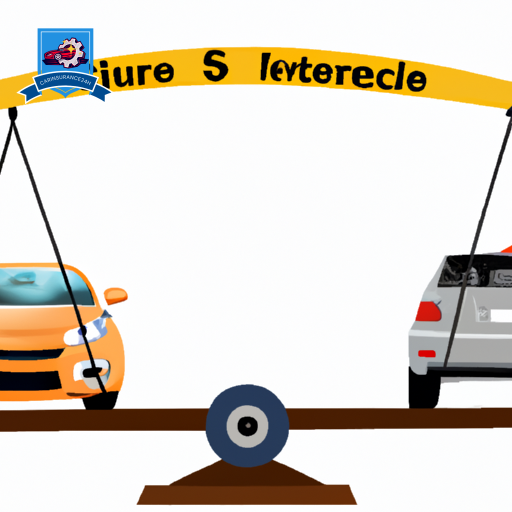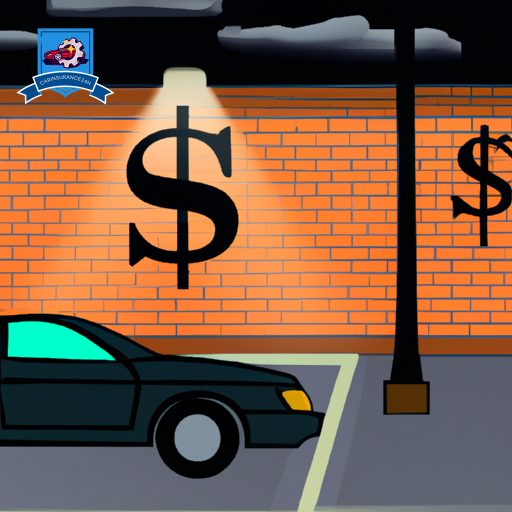In the intricate world of financial management and risk assessment, few consumers are aware of the significant role their credit score plays in determining their car insurance rates. This connection, often overlooked, is predicated on the concept of an insurance score, which insurers use as a predictive tool to assess the likelihood of an individual filing a claim.
The methodology behind how insurers utilize your credit score to influence your premiums is both complex and enlightening. As we explore the impact of credit scores on insurance rates, it becomes imperative to understand the underpinnings of this relationship and the potential for policyholders to secure more favorable rates through the improvement of their credit.
The implications of this connection are vast, hinting at an intriguing intersection of financial health and insurance economics that warrants further exploration.
Understanding Credit Scores

A credit score is a numerical representation of an individual’s creditworthiness, derived from their credit history and used by lenders to gauge the risk of lending. This score is pivotal in determining the terms of credit, including interest rates and loan approval. The intricacies of credit score calculation involve several key factors, each weighted differently, reflecting the importance of various aspects of an individual’s financial behavior.
The foundation of a credit score lies in one’s credit history, which encompasses the record of borrowing and repayment, including the amount of available credit used, the length of credit history, types of credit in use, and any new credit. Payment history, as a critical component, accounts for a substantial portion of the score calculation, underscoring the significance of making payments on time. Credit utilization ratio—how much credit is used compared to the available credit limit—also plays a pivotal role, with lower utilization being favorable.
Score calculation models, such as those developed by FICO and VantageScore, analyze these factors, among others, to compute a credit score. This score typically ranges from 300 to 850, with higher scores indicating lower credit risk. The methodology behind these calculations is designed to provide a snapshot of an individual’s financial reliability.
Understanding the dynamics of credit scores, including the factors influencing score calculation and the importance of maintaining a positive credit history, is essential. This knowledge not only aids in securing favorable lending terms but also underscores the broader significance of financial management and its impact on various aspects of one’s financial life.
The Insurance Score Connection
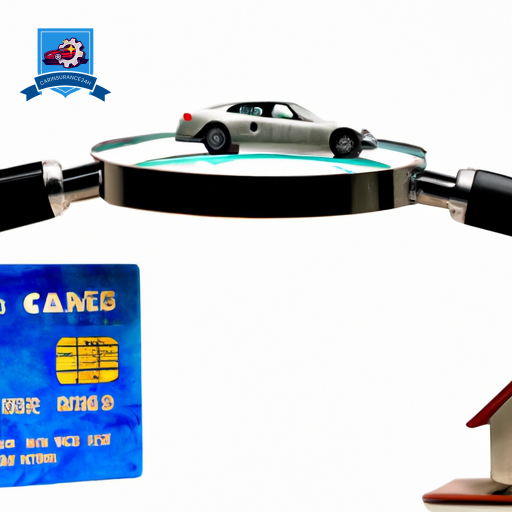
Understanding the intricacies of credit scores offers a foundation for exploring how these scores extend their influence to the area of car insurance through the concept of an insurance score. An insurance score, while influenced by one’s credit score, is a significant measure used by insurance companies to assess the risk of insuring an individual. This differentiation is essential because it addresses common credit history misconceptions and score confidentiality concerns that many consumers harbor.
The insurance score is derived from certain elements of an individual’s credit history, such as payment history and outstanding debts. However, it is tailored to predict the likelihood of an insurance claim being filed rather than the ability to repay borrowed money. This distinction is critical in understanding how credit-related actions can influence one’s insurability and, consequently, insurance premiums.
Credit history misconceptions often stem from a lack of understanding about what factors into an insurance score. For example, many believe that checking their credit score frequently harms their score, which is not the case for soft inquiries like those typically done for insurance purposes. Another common misconception is that all debt negatively impacts one’s insurance score, disregarding the fact that a history of managing credit responsibly can actually be beneficial.
Score confidentiality concerns arise due to the sensitive nature of credit information. However, federal regulations require insurers to maintain the confidentiality of personal information, including details used to calculate an insurance score. This means that while your insurance score is influenced by your credit history, the specifics of your financial behavior are securely managed and used responsibly to assess insurance risk.
How Insurers Use Your Score
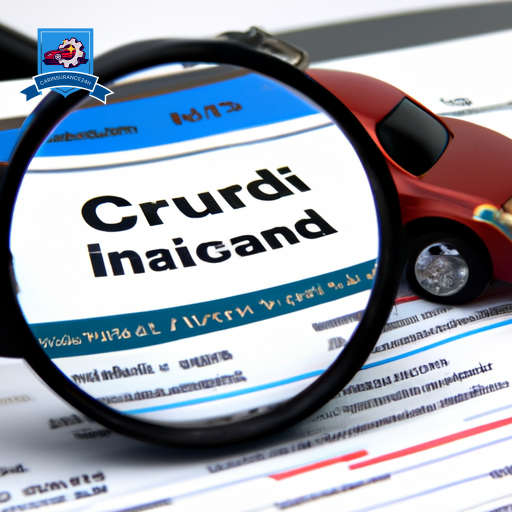
Insurance companies leverage your insurance score as a pivotal tool to gauge the risk associated with offering you a policy, directly influencing the premiums you are charged. This score is derived from your credit history, but it’s important to understand that it doesn’t mirror your credit score exactly. Instead, it’s a distinct metric insurers use to predict how likely you are to file a claim. The rationale behind this practice is rooted in statistical analysis, which has shown a correlation between certain credit behaviors and the propensity to file insurance claims.
The use of your insurance score can vary notably due to regional variations. Some states have stringent regulations that limit or even prohibit the use of credit information in determining insurance rates. Consequently, the impact of your credit on your insurance premiums can be markedly different depending on where you live. It’s essential for consumers to be aware of their state’s stance on this issue to better understand their insurance rates and rights.
Regarding score confidentiality, insurance companies are bound by federal and state laws that dictate how they can use and protect your personal information. They must make sure that your data is securely handled and that your privacy is maintained. This means that while they can use your credit information to derive your insurance score, the specifics of your financial history are treated with a high degree of confidentiality. Insurance firms are required to inform you if your credit information adversely affects your insurance terms, providing a transparent process that respects consumer rights while evaluating risk.
Impact on Your Premiums
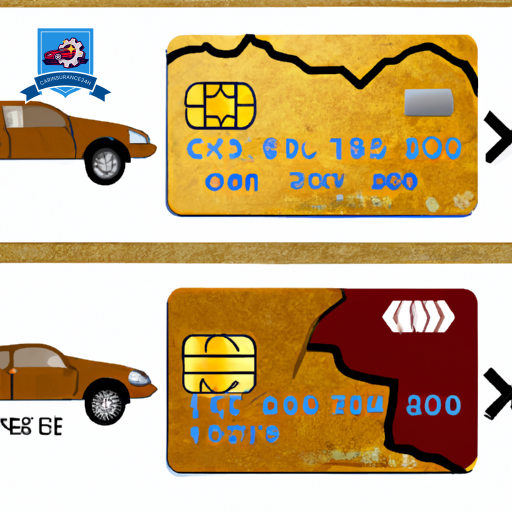
Given the significant role that your insurance score plays in evaluating risk, it naturally follows that this metric has a direct effect on the premiums you will be charged for car insurance. Insurers consider a plethora of risk factors, including your credit score, to determine the likelihood that you will file a claim. A lower credit score is often interpreted as a higher risk, leading to higher premiums, whereas a higher score suggests a lower risk and can result in more favorable rates.
Here are four ways your credit score impacts your car insurance premiums:
-
Risk Assessment: Insurers use your credit score as a key component in their proprietary algorithms to assess risk. A lower score can categorize you as a higher risk, thereby increasing your premiums.
-
Policy Options: Your credit score might affect the variety of policy options available to you. Those with higher scores could have access to more competitive rates and a broader range of coverage options.
-
Payment Plans: Some insurers offer flexible payment plans to those with higher credit scores. Conversely, a lower score might limit your payment options, requiring larger upfront payments.
-
Renewal Rates: Upon renewal, your insurer will likely reassess your risk factors, including your credit score. Improvements in your score can lead to lower premiums, whereas a drop in your score could result in higher rates.
To summarize, your credit score serves as a critical factor in the eyes of insurers, influencing not just the cost of your premiums but also the terms and availability of your policy options.
Improving Rates With Better Credit

Recognizing the direct impact of your credit score on car insurance rates, starting on credit repair can be a strategic approach to securing lower premiums. Beginning on credit repair involves both short-term and long-term adjustments to your financial habits. Initially, this may seem challenging, but the rewards of lower insurance costs, among other financial benefits, are significant.
To start with, scrutinize your credit report for any inaccuracies that might be negatively affecting your score. Disputing errors and getting them corrected can provide a relatively quick boost to your credit score. Concurrently, focus on reducing outstanding debt and keeping credit card balances well below their limits. These actions demonstrate responsible credit management, reflecting positively on your credit score.
Adopting healthy financial habits is important for sustained credit improvement. This not only aids in credit repair but also influences insurers’ perception of your risk profile. Consider the following table, which outlines key actions and their potential impact on your credit score:
| Financial Habit | Potential Impact on Credit Score |
|---|---|
| Paying bills on time | Positive |
| Keeping balances low | Positive |
| Limiting new credit applications | Positive |
These practices signal to insurers that you are a lower-risk customer, potentially leading to more favorable car insurance rates. Remember, improving your credit score is a process, not an overnight fix. Patience and consistency in maintaining good financial habits will ultimately result in better car insurance rates and overall financial health.
Frequently Asked Questions
Does Checking My Credit Score for Insurance Purposes Affect My Credit Rating?
Checking your credit score for insurance purposes typically involves soft credit inquiries, which do not affect your credit rating. Consequently, this process can be undertaken without concern for impacting score improvement efforts.
Are There States Where Using Credit Scores for Determining Insurance Rates Is Prohibited?
Yes, there are states where legislative changes have prohibited the use of credit scores in determining insurance rates, aiming to reduce credit disparities. This policy varies by state, reflecting different approaches to consumer protection.
Can I Obtain Car Insurance if I Don’t Have a Credit Score?
Yes, obtaining car insurance without a credit score is possible through credit building strategies and exploring insurance alternatives. Providers may offer solutions that focus on other risk assessment factors, ensuring coverage for those maneuvering financial growth paths.
How Do Life Changes Like Marriage, Divorce, or the Death of a Spouse Affect My Insurance Score and Subsequent Rates?
Life changes such as marriage, divorce, or the death of a spouse can greatly impact your insurance score through credit improvement or risk assessment alterations, leading to changes in your insurance rates accordingly.
Is It Possible to Negotiate Lower Insurance Rates if I Believe My Credit Score Does Not Accurately Reflect My Risk Level?
Is your insurance rate higher than expected? Engaging in credit repair and employing negotiation tactics may offer a resolution. It’s critical to present a strong case that accurately reflects your risk level to insurers.

